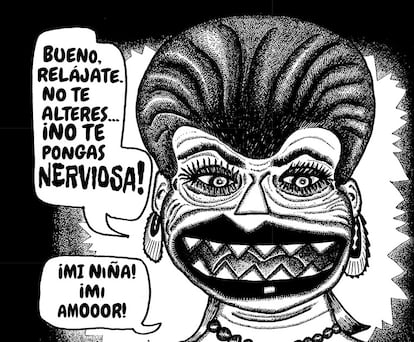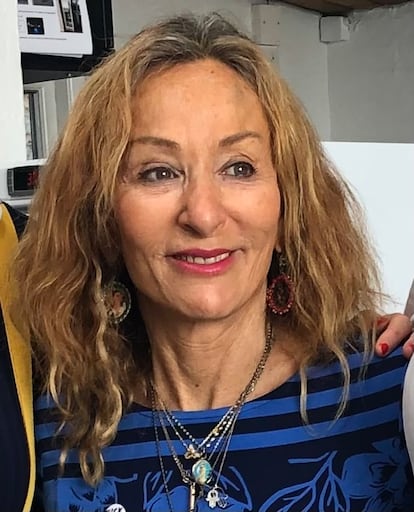Aline Kominsky-Crumb, the queen of anti-politically correct comics: Drugs in pregnancy and spankings in drawings
The illustrator and Robert Crumb’s partner, who was known for her radical, liberated comics replete with sex and humor, died in November

In the 1960s and 1970s, comics took a sidereal trip to San Francisco, then a city in which hippies, yippies, pimps, drug dealers, hookers, whores, freaks, eclectic musicians, bikers and revolutionaries of all stripes gathered together. Joining them were illustrators who wanted to blow people’s minds by drawing that atmosphere of acid trips and joint smoke. Robert Crumb and Aline Kominsky were two names that stood out in that scene. The former was the international figurehead of a highly sexualized comic who employed a wealth of forms and backgrounds; he was brilliantly sharp in all areas. The latter was the creator of biographical works that were less flashy but not exactly out of modesty or shyness. Both were part of the Underground Comix cartoonist collective. The couple married in 1978. Each had their own career and their comics circulated widely around the world. Their work was trendsetting and they talked about experiences beyond the typical American way of life.
Kominsky-Crumb died in November. Her work focused on food, sex, death, happiness, love and pain. She detailed her life in her comics, from her first sexual experience as a teenager to going to live in a castle in the south of France with her husband to becoming a grandmother when her daughter Sophie had her own child. Her comics were testaments to independence and vindicated desire while rejecting moralistic morality and emasculating religions. She depicted her life and journey full of sex, drugs and music, and did so without modesty or social formalism. Kominsky-Crumb also told of her early adoration of the Beatles, her volatile relationship with her family, and her tense time at the women’s comics collective Wimmen’s Comix.

Sophie Crumb Kominsky (Woodland, California, 1981), her daughter with Robert Crumb, says that her mother was “a true outsider even within the underground, a 100% original, self-made artist. Her humor is very specific, [it’s] not necessarily accessible to everyone, and her drawing is naive and anti-academic.” Sophie, who is also a noted illustrator, notes by email that she’s “very proud to be her daughter.” On her mother’s idea of being an “outsider,” Sophie observes that her mother changed the meaning of what feminism meant: “She brought sexual freedom to feminism, the right to be anti-politically correct, to be hypersexual, to love and to be spanked as well. And that’s a huge part of what it means to be a free woman, it’s about not caring about norms or being accepted by a group. In my opinion, she was a punk.”
As with punk, at least in its original version, Kominsky-Crumb surprises and shocks an audience that’s unaccustomed to breaking the rules. Hillary Chute, an art professor at Rutgers University and an expert in comics, notes: “Her work uniquely combines images of desire and repulsion and brings visibility to the disgusting aspects of women’s bodies and desires. In this age of moral judgment that weighs in on maternal behavior, admitting to having used lots of drugs during pregnancy is not a conventional thing to share publicly, especially since she is unapologetic and not the least bit ashamed.”

Sophie Crumb Kominsky believes that her parents were “the best artists in the world.” She adds that she admires her mother’s “originality, humor and realism. She always had a weird and hilarious comment to make, a strange face to draw or a peculiar idea to contribute.” Jaume Bonfill, the literary director at Reservoir Books (which published Kominsky-Crumb’s work in Spanish), met the author in 2016. He describes her as “a woman [who was] full of energy, highly educated, charming and seductive.” He said that her work “blows your mind” and adds: “She takes the path of formal radicalism and deliberately strange drawing, [using it] in the service of her own truth. [She created] a graphic language that hadn’t been done yet and… fifty years later, [it] has not lost its relevance.”
Sign up for our weekly newsletter to get more English-language news coverage from EL PAÍS USA Edition
Tu suscripción se está usando en otro dispositivo
¿Quieres añadir otro usuario a tu suscripción?
Si continúas leyendo en este dispositivo, no se podrá leer en el otro.
FlechaTu suscripción se está usando en otro dispositivo y solo puedes acceder a EL PAÍS desde un dispositivo a la vez.
Si quieres compartir tu cuenta, cambia tu suscripción a la modalidad Premium, así podrás añadir otro usuario. Cada uno accederá con su propia cuenta de email, lo que os permitirá personalizar vuestra experiencia en EL PAÍS.
¿Tienes una suscripción de empresa? Accede aquí para contratar más cuentas.
En el caso de no saber quién está usando tu cuenta, te recomendamos cambiar tu contraseña aquí.
Si decides continuar compartiendo tu cuenta, este mensaje se mostrará en tu dispositivo y en el de la otra persona que está usando tu cuenta de forma indefinida, afectando a tu experiencia de lectura. Puedes consultar aquí los términos y condiciones de la suscripción digital.








































